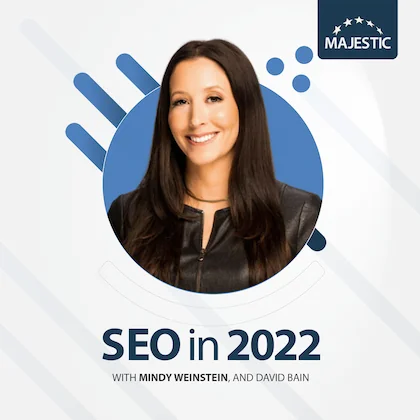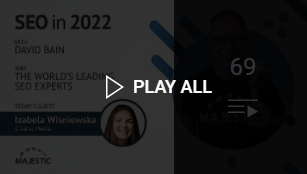-
Site Explorer
- Majestic
- Summary
- Ref Domains
- Backlinks
 New
New Lost
Lost- Context
- Anchor Text
- Pages
- Topics
- Link Graph
- Related Sites
- Advanced Tools
- Author ExplorerBeta
- Summary
- Similar Profiles
- Profile Backlinks
- Attributions
- Compare
-
Link Tools
- My Majestic
- Recent Activity
- Reports
- Campaigns
- Verified Domains
- OpenApps
- API Keys
- Keywords
- Keyword Generator
- Keyword Checker
- Search Explorer
- Link Tools
- Bulk Backlinks
- Neighbourhood Checker
- Submit URLs
- Experimental
- Index Merger
- Link Profile Fight
- Mutual Links
- Solo Links
- PDF Report
- Typo Domain
- Free SEO Tools
-
Support
- Blog

- Support
- Get started
- Tools
- Subscriptions & Billing
- FAQs
- Glossary
- How To Videos
- API Reference Guide

- Contact Us
- About Backlinks and SEO
- SEO in 2024
- Link Building Guides
- Webinars
- Blog
Intent is the direction that the search engines are going in
Mindy Weinstein
According to Mindy, search engines are also moving towards gaining a better understanding of user intent.

Intent is the direction that the search engines are going in
Mindy says: "Focus a lot more time and attention into recognising, and identifying, searcher intent. It's not anything new, I've been talking about it for years. However, search engines are always evolving and are using newer technology to try to understand the 'Why' and the 'What' behind searches. From an SEO perspective, we need to dig deep into that. Getting the right traffic is more important than just getting as much traffic as possible."
How do search engines determine intent?
"If you look at some of Google's recent patents, many of them are focussed on Natural Language Processing, and understanding the relationships between words. I believe they're using that to identify intent. They're looking at pages and identifying which specific queries indicate that someone is doing research, and which indicate that someone wants to buy something. There are also what Google calls the 'micro-moments', all the things that happen in between the 'know' intent and the 'buy' intent. They're using AI technology to understand this.
I focus a lot on psychology. We have to try to determine where someone is coming from when they search. It will take a lot longer to do keyword research, but it's about getting the right traffic. I can tell a client that organic search went up 50% but the follow-up question is always: 'How many of those converted?'. We're held responsible for getting the right traffic, so we need to understand intents."
Will developments in Natural Language Processing cause keywords to lose significance?
"They still matter. However now, when you do keyword research, you should be spending time going after more than just one-word phrases. It's great if a shoe company ranks number one for 'shoes', but that's not really quality. You need to be able to target something more specific. You need to develop an understanding of a particular type of searcher. If your marketing department has created personas, go through those. Really try to get into the mindset of the searcher, facing a particular problem or looking for a particular type of solution. Consider what their specific search will be.
Keywords matter even more than before, because we now have to know what someone is actually going to say into their phone, or type. It's more than one or two words; searchers now put in a whole question. As SEOs, we have to become better at the psychological aspect and identifying where the searcher is coming from.
It will even be different within different areas. I've worked with lawyers that service different areas of law and different states. In one state someone's going to describe their car accident differently than someone in another state or, even more so, another country. We're not getting away from keyword research, it's actually even more important. It's a process that you have to spend some time on."
Is there still a place for one or two-word keyword phrases?
"Recently I don't think I've worked on a one-word keyword anywhere. It's so broad. However, I'm sure there are scenarios where one word can be very specific and relevant, and it makes sense. I can't say that no-one should be targeting them.
When looking at keywords, focus more on relevancy than just the volume. If you know that a phrase is relevant, and you've taken the time to understand that if someone is searching for it, they are looking for a solution that you offer, then go after that. Even if it's a lower volume, target the intent - understand where they are in their process and focus on getting them to convert. You may not get as many people, because it's a lower volume, but when they get to you, they're really ready to take a desired action."
How do you optimise for the various ways that one concept will be described by different people in different places?
"It's a challenge. It will get better over time but even right now you don't necessarily need to have a separate page for each term or phrase. I had a client that offered boat docks, but in some areas, people refer to them as 'piers'. That is tricky, but within content you can switch out the terms a bit and use those that are most common on one page. It gets to be a bit much if you have them separated into each page. You don't need to have one page per keyword, you can service a lot of phrases in one place. Search engines are getting smarter and are becoming more able to understand what your page is about from the content and context."
Is identifying relevancy a manual task or is there a good tool to help?
"A lot of it is applying wisdom and experience to your data. If you have information about who your target searchers are, look at those and match where a phrase is relevant to them. I don't rely on a tool for that, but it can be a significant time investment. If you've got hundreds of keywords, and you're trying to figure that out, you have to scale it down. Identify which are the higher priority and which of those are the most relevant.
Once you've identified some phrases where you know the right intent is there - and it's relevant - it's important to be aware of what type of pages are showing up at the top the results. Are they government pages or articles? This will help you to determine whether or not you're in the natural realm of what the search engines expect to see and what they're rewarding."
What kind of intent are you looking to map to keywords?
"At the start of a project, when you're looking at your list of keywords, you want to identify the 'know' intent and the 'buy' intent. For 'buy', it doesn't have to be eCommerce - it just means that they want a transaction of some kind. Based on these keywords, you can look at which pages you need to optimise, or maybe create. If it's a 'know' intent you may want to create a guide, a How To, or an article. If you're mapping to the 'buy' intent, you can optimise product pages or service pages, or create new ones. In my keyword research, I have a column where I put the intent so that I know what I'm trying to optimise. If you're going up against pages that are ranking by targeting the 'know' intent, and you've optimised a product page, it's going to be very difficult for you.
That's the groundwork, and on top of it, you need to be thinking about the journey. There are a lot of different journeys, but I focus on the journey of Awareness, Consideration, and Purchase. You need to know, and service, the words and phrases that someone might use at each of those stages. More questions are going to show up in Awareness. Moving into Consideration, you might have more comparisons and by the time they reach Purchase, they're going to be putting in more branded terms. There's also post-purchase. If someone has purchased something and they have an issue, they're likely to search Google. If you can provide the answer, you're much more likely to keep a satisfied customer. At each stage they should keep getting to your website."
How can you make improvements for a page with high traffic but low conversions?
"For that issue you should start with your money pages - the pages that are converting. It could be service pages, category pages, or product pages. Then you need to look at how that page is showing up, and what queries it's showing up for. Go to Google Search Console, see what queries are getting clicks, and consider if those make sense for your page. Sometimes there's a mismatch. Sometimes the page isn't showing for a particular phrase that it was supposed to be optimised for, or for one that would get better traffic. Then you can re-examine the page and start to reverse engineer it.
If your page is not showing up for a phrase that would actually convert, look at the pages that are. Consider the intent of those pages and whether that aligns with the intent of your own page. If not, you're going to have to make adjustments. Perhaps you need to create something that's more article-based and send the user back to a product page through there.
If you're getting a lot of clicks but a really low time on-page, then the page is likely not addressing the user's needs in an obvious way. Make sure your H1 is right there telling them that they're in the right place, break up the content, and have buttons to guide them. You're going to have to do a bit of tweaking. Perform a page-by-page analysis, starting with your money pages."
What is something that SEOs should stop doing to focus more time on mapping intent and getting better traffic?
"Technical SEO can take a lot of time, because if your foundation is not solid nothing else matters. However, a lot of SEOs spend time going through automated audits, getting fixes, and sending them off to the developer, without looking at what is going to move the needle. You need to make sure that these changes are going to make a difference in traffic, not just give busy work for yourself and the developer. Running, sending off, and chasing down reports is not always an effective use of your time. Still focus on technical, but only focus on the things that are going to make a difference, like indexing or crawling. Don't get bogged down in the little things that are taking your time away from something important, like making your keyword research a lot deeper."
You can find Mindy Weinstein over at MarketMindShift.com.
Choose Your Own Learning Style
 Video
Video
If you like to get up-close with your favourite SEO experts, these one-to-one interviews might just be for you.
Watch all of our episodes, FREE, on our dedicated SEO in 2022 playlist.
 Podcast
Podcast
Maybe you are more of a listener than a watcher, or prefer to learn while you commute.
SEO in 2022 is available now via all the usual podcast platforms
Don't miss out
Opt-in to receive email updates.
It's the fastest way to find out more about SEO in 2025.
Could we improve this page for you? Please tell us





